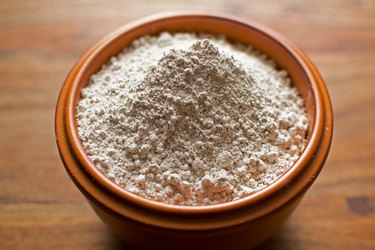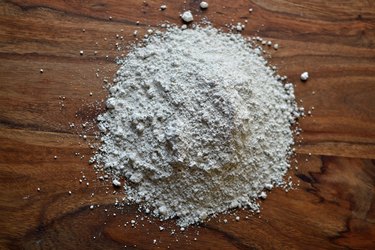Is Diatomaceous Earth Safe For Cats and Dogs?
Only the food-grade diatomaceous earth is safe for pets. However, many veterinarians are reluctant to recommend diatomaceous earth because if it is used incorrectly or overused it can cause problems.
Diatomaceous earth can be useful around the house and garden, from keeping some pests at bay to deodorizing the refrigerator or those over-used sneakers. Diatomaceous earth is sold in food-grade (human grade) and non-food grade (industrial grade) formulations.It may be used topically to control parasites like fleas and ticks, administered as a de-wormer, and consumed as a beneficial supplement — but should only be used with pets or food if you have the food-grade type.
Video of the Day
Video of the Day

What is diatomaceous earth?
First of all, what is this stuff? Known as D.E., diatomite, or kieselgur, diatomaceous earth is a naturally occurring soft, siliceous rock that is absorbent and can be easily crumbled into a fine, chalky, white or off-white powder that resembles talcum powder. Most diatomaceous earth is a composition of amorphous silicon dioxide.
Diatomaceous earth looks like a fine powder but when you look at it under a microscope you can see a lot of sharp, jagged edges, which is what makes it useful in pest control. The powder is actually made of bits of silica from the skeletons of single-celled microscopic algae called diatoms. These diatoms — the namesake of diatomaceous earth — make up 26 percent of the earth's crust by weight! The diatoms are the only organism on the planet with an exoskeleton made of silica. When these tiny creatures die, they do not decompose, but instead sink to the bottom of the waterways, oceans, and wetlands of the world where they accrete into a substance that is mined.
They're not technically the fossilized remains because their cell walls are not replaced by another mineral, but diatoms amass and are preserved for up to tens of millions of years. Today, silica deposits are mined for many commercial uses, including as a component in the manufacture of diatomaceous earth.
Is diatomaceous earth safe for pets like cats & dogs?
Food-grade diatomaceous earth is chemically inert and virtually harmless for pets and their people when used for pest control and consumed as a supplement. It's extremely important to ensure you are using food-grade D.E. for any pet applications. If shopping in-store, thoroughly read the label. And if shopping online, verify the grade with the vendor if it's not indicated in the listing. Taking the wrong grade of diatomaceous earth may compromise your pet's health and industrial-grade D.E. is not safe for humans to handle at all.

How is diatomaceous earth used?
There are many products that contain diatomaceous earth which promote their use against pests like bed bugs, cockroaches, crickets, fleas, ticks, and spiders. Most of these products are powders. The products may be sprinkled onto a dog's coat or cat for use on adult fleas and their larvae. Using too much of the powders or using it in a way that is not recommended can cause your dog's skin to become overly dry.
Industrial-grade diatomaceous earth is highly concentrated and is used in the mining and construction industries to stabilize nitroglycerin, or as a filter in swimming pools and aquariums. Farmers may also spread it over fields to prevent disease and eliminate parasites from the soil before planting crops. D.E. is also used by food manufacturers to filter beverages during the production process. Farmers may use D.E. as an anti-caking agent in livestock feed.
Precautions when handling diatomaceous earth
Diatomaceous earth works by being so absorbent that it dries out the pests skin or covering. The jagged edges make this process happen faster. While you should avoid contact altogether with industrial-grade diatomaceous earth, you should also handle food-grade D.E. with care. It's a natural drying agent and is potent enough to dry out the skin, cause irritations in the esophagus, and its superfine consistency can irritate the nasal passages and lungs, so be careful not to inhale it.
Always wear gloves and a face mask when using D.E. whether you're removing pests from your pet or the garden.
Diatomaceous earth for flea control for dogs and cats
Many pet parents prefer not to use pesticides in and around the home or on their pet's skin. Diatomaceous earth is an effective, non-toxic natural alternative to chemical pesticides that are typically given to pets to get rid of fleas. Dusting your pet's fur with diatomaceous earth controls external parasites, such as fleas, ticks, and flies, including their eggs. You can also apply D.E. to your pet's bedding and the carpeted areas your pet frequents.
Since D.E. is actually microscopic pieces of jagged crystalline silica similar to broken glass, the sharp edges and the drying effect is what works against the insect's exoskeleton, like fleas. The powder is used in a similar way in the garden because the sharp edges deters pests such as snails from crawling onto plants.
FAQs on the website of the National Pesticide Information Center explains that the products which have been evaluated for pest control will have an EPA registration number. If the product is considered safe for use as an insecticide, the label will say how much to use and how to use it safely.

De-worming with diatomaceous earth
Whipworm, pinworm, and hookworm infestations are infestations said to be successfully eliminated by using D.E. Before you start using D.E. for internal parasites in your pets, be sure to check with your veterinarian.
The bottom line
Diatomaceous earth, like many other alternative therapies, is not a "cure-all" and, if used as a pet food supplement or for flea prevention, it should be in moderation, and only after consulting with a veterinarian. D.E. should be used in addition to, not as a substitute for medical care. Although there are reported benefits of diatomaceous earth, have a chat with your veterinarian about any potential side effects of giving D.E. internally and about safe handling if it before you decide to administer it to your pet. When using diatomaceous earth food-grade form externally for flea treatments, dust lightly and protect yourself by wearing gloves and a mask while using the product.